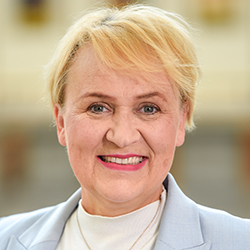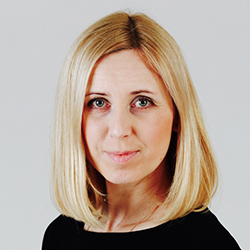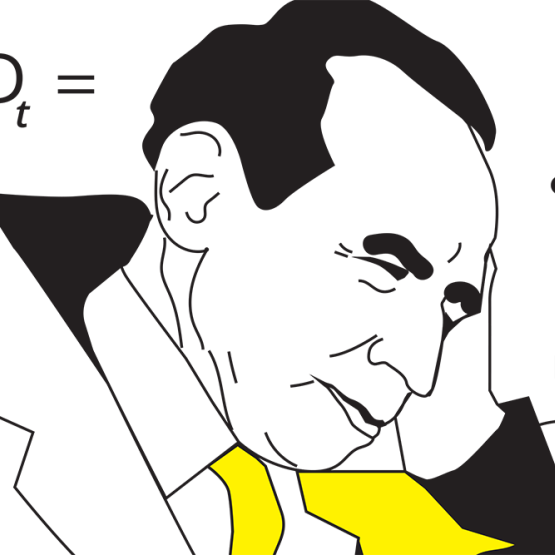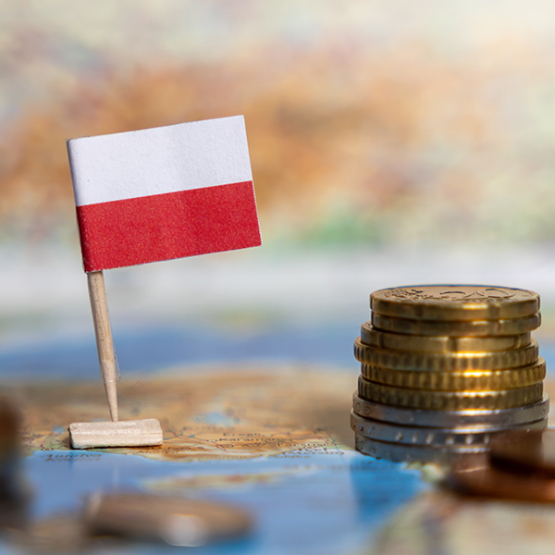
After 20 years of membership in the European Union, it is an important challenge to discuss the issue of Polish membership in the EU with representatives of Generation Z. According to the results of research (e.g. CBOS, 2024), it is the young people who do not have this kind of knowledge; they take the membership for granted because they were born or raised after 2004. One of the challenges to tackle in the near future is how to end the war in Ukraine and how enlarge the EU by this country and the Western Balkans. Poland understands the importance of these challenges and its role is to raise people’s awareness and constantly remind them that the eastern border of Poland is the eastern border of the European Union and the ongoing war in Ukraine is a war in Europe.
For Ukraine, following the path of European integration is a strategic civilisational choice defined in the constitution in 2019 and supported by 90% of Ukrainians1. The role of the young generation in this choice was crucial, because it was the protest of student youth and the so-called Euromaidan that began the Revolution of Dignity, which initiated Ukraine’s departure from the pro-Russian course in favour of a decisively pro-Western direction. The Russian aggression in 2014 is a reaction to this choice, and a full-scale war is the price that Ukraine is paying for taking a pro-EU course. After a quick application (28 February 2022) and granting EU candidate status (23 June 2022), the European Council decided to open negotiations with Ukraine on 14 December 2023, and negotiations officially began on 25 June 2024. The dynamics of integration processes must be supported by intensive activities aimed at preparing negotiation teams, educating staff, improving competences and knowledge of the operation of European institutions, and active cooperation with European partners with regard to their accession experience. And this was the focus of the study visit to Brussels, organised by the Rector’s Representative for Cooperation with Ukrainian Universities, Doctor Iryna Degtyarova and the Rector’s Representative for European Union Affairs, Habilitated Doctor Małgorzata Molęda-Zdziech, Professor at SGH.
The aim of this visit was to learn about the operation of the “European Bubble”, as the institutional labyrinth in Brussels is often called. The moment was extremely interesting for several reasons. First, it was in December 2024 that the institutions started working in a new institutional cycle and in a new composition. Ursula von der Leyen took the helm of the European Commission for the second time. After the June elections to the European Parliament, a new composition of this institution was formed, with right-wing populist forces strengthened.
Second, on 1 January 2024, Poland took over the rotating six-month presidency of the Council of the EU. It is worth remembering that one of its priorities is external security, including, besides the development of military infrastructure, the continuation of comprehensive support for Ukraine, struggling against the Russian aggression. Poland will seek the EU military assistance to Ukraine, its stable, long-term financing, as well as the EU participation in Ukraine’s recovery. A stable neighbourhood is a prerequisite for the European security. Therefore, the enlargement of the Union to include countries that share the EU values is a geopolitical priority.
It should also be remembered that accession negotiations are a long process as many conditions should be met. Apart from the political level, which we have no impact on, or it may at most be moderate, the scientific community should get prepared for the accession. They may already be present in the EU forum, participating in the work of associations such as the European University Association (EUA), they may be active in the European Research Area. The significance of European cooperation and the need for greater involvement of universities in preparing Ukraine for accession was emphasised by Oksana Diakun, Deputy Ambassador of the Mission of Ukraine to the EU. Ukrainian universities, in cooperation with Polish and European partners, should be able to meet the growing demand for specialists in European integration.
“One of the most important conclusions is a clear understanding of European support for Ukraine. At the same time, it is clear that reforms are necessary for integration. To this end, Ukraine needs to have many specialists in various fields with a new way of thinking, as well as to understand the values, principles and approach of the European Union. The implementation of European values and principles in education is crucial for the further preparation of specialists,” said Halyna Makhova from the Kyiv School of Economics (KSE).
“The study visit to Brussels provided us with valuable information about the European integration process and its implications for Ukraine. The integration process is a dynamic and complex interaction of different actors, each pursuing their own interests. In the coming years, the EU is expected to undergo significant changes in its priorities, making Ukraine’s active participation in this process crucial. By seizing the opportunities offered by integration and learning from the experience of other member states and social groups, Ukraine can improve its strategic position and overall development. The visit also highlighted great opportunities available in the European area of education and research to be fully used by Ukrainian universities, educators, researchers and students,” pointed out Petro Baikovsky from the Ukrainian Catholic University (UCU).
From the point of view of the conducted activities but also from the point of view of representing civil society, it was important to visit the Economic and Social Committee. Andris Gobins from Latvia talked about initiatives to support Ukraine at the EU level. We emphasise this fact because common history and experience (the historical past within the Soviet Union) are the best guarantee of understanding the current situation of Ukraine, but above all the threat posed by Russia, which wants to maintain its imperial influence in the region.
“An essential role and opportunities of young people in the EU are understood as a project for democratic development. The long-term process of EU policies and youth involvement in them is an important goal, as the nature of policies as well as youth engagement will directly affect their future,” noted Olga Stasiv, a UCU student.
The experience of the visit to Brussels changes the perspective, as the participants themselves said, and makes anti-European groups that like dazzling with the formula that Brussels “imposes” or “orders” us to do something. On entering the EU labyrinth of institutions, we can see the rationalisation of the decision-making process, its planning, transparency, with clearly defined moments of consultation with stakeholders, and as a result – opportunities to participate in this process. Evidence-based policy and science-based policy are the rules that govern this process. Therefore, universities should change and expand the education about the European Union and Europe in such a way as to prepare experts necessary in the integration process on the one hand, and on the other hand, equip a wider community with knowledge and shape the European attitudes of citizens, especially the young ones. Thus, the visit will have a great impact on teaching at Ukrainian universities.
“My participation in the study visit will allow me to strengthen the European dimension in the academic disciplines taught at the Vadin Hetman Kyiv National Economic University (KNEU) to students specialising in public management and administration, in particular in disciplines for undergraduate and graduate students such as European integration and EU standards, social technologies in public administration, economic policy and public finance management and strategy and change management, as well as in the final workshop for building professional competences in public management and administration,” said Nataliya Fedirko from the KNEU.
”The experience gained during the trip will be directly implemented at the National University of the Kyiv-Mohyla Academy (NaUKMA) in the curriculum, including public administration. In the next academic year, we also plan to change the curriculum for law students towards the implementation of EU law,” announced Volodymyr Venher from NaUKMA.
“The role of universities is to train professionals who will participate in reforms to rebuild the country after the end of hostilities, to engage young people and broad segments of society, to carry out a teaching mission, to organise training for community representatives in project management in order to effectively exploit the opportunities of EU financial support. (…) The coming years may become a time of transformation of curricula and the creation of new study programmes. Supporting and developing leadership competences at various levels in the management system of higher education institutions is also essential,” emphasised Svitlana Zhiltsova from the Vasyl Stus Donetsk National University (DonNU).
Direct contacts in Brussels enable breaking stereotypes and building a network for the development of international cooperation between Ukrainian universities, SGH and the CIVICA Alliance:
“As the coordinator of international cooperation in the KSE, I believe that the participation in the visit will have a direct impact on new partnerships and projects under the EU programmes. In addition, a number of new ideas were generated during the visit, including the launch of the Euroclub in the KSE, strengthening cooperation within the CIVICA alliance, writing projects on mobility and capacity building” pointed out Kostyantyn Kyrychenko from the KSE.
In conclusion, the immersion in the “European Bubble” in Brussels showed that Ukrainian universities can and should become leaders in the process of European transformation in cooperation with partners and alliances of European universities. Because it is alliances that are called the beacons of European values and the European way of living. Ukrainian universities show the society a clear example of how to implement various projects in the country, how to promote European principles and change the approach, how to use the partnership opportunities in the EU. Universities are also responsible for shaping future generations in the spirit of democratic society and attitudes of civic responsibility, which directly translate into the functioning of EU institutions. Due to the growing demand for specialists in European integration, Ukrainian universities, supported by partners, should intensify their activities for staff training and youth involvement.
It has been known for years that the most effective channels of influence are direct contacts. Therefore, due to conversations we are able to break stereotypes, ask about doubtful issues or verify information provided by the media or politicians, who are not always impartial. Only direct visits can build a feeling and conviction that we are in a common Europe, that Europe is ours. The direction Europe is heading for also depends on us.

Habilitated Doctor MAŁGORZATA MOLĘDA-ZDZIECH, Professor at SGH, Head of the Department of Political Studies, Collegium of Socio-Economics, SGH, Rector’s Representative for Cooperation with the European Union

Doctor IRYNA DEGTYAROVA, Rector’s Representative for Cooperation with Ukrainian Universities



